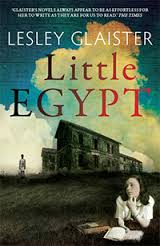 Published by Salt 15 March 2014
Published by Salt 15 March 2014
317pp, paperback, £9.99
Reviewed by Shirley Whiteside
Lesley Glaister’s gloriously gothic novel, her twelfth, spans almost a century, with the crumbling country mansion of Little Egypt at its heart. She splits the time frame between present day and the 1920s when twins Isis and Osiris, who live in Little Egypt, were children. Their parents, amateur Egyptologists, have joined the ‘mummy rush’ and decamped to Egypt to search for Herihor. It soon becomes apparent that they have more money than sense. The twins are left in the care of Mary, the grumbling housekeeper, with occasional visits from Uncle Victor who was badly wounded in the Great War and still bears the mental and physical scars. In the present day the elderly twins still live in Little Egypt, Osiris upstairs and Isis downstairs. They have neither seen nor spoken to each other in 10 years. Isis puts provisions into a basket which Osiris hauls up to his lair, her only proof that he is still alive.
Glaister paints a disturbing picture of fickle parents more interested in the glory of discovery than their own children. They spend a fortune pursuing their dream leaving their children living in genteel poverty. Isis is a desperately lonely young girl while her uncommunicative brother Osiris tries to attract his parents’ attention by becoming equally obsessed with ancient Egypt. The scenes set in Egypt when the twins are children are particularly vivid; the overwhelming heat, the dust, and the cool breezes as they sail on the Nile. It is all a far cry from the desert romance novels that Isis has been reading.
In the present day, the now decrepit Little Egypt stands on an increasingly small island of countryside, bordered by a motorway and a supermarket. Isis has had to sell off parcels of land in order to keep afloat financially and the image of modern life creeping ever closer is poignant. Glaister’s narrative smoothly switches between first person and third person but always focusing her story through Isis’s eyes. Her prose is unshowy but highly effective, with some lovely descriptive passages and fresh metaphors. Glaister skilfully builds the tension and dread as she goes back and forward in time and while a pall of anxiety hanging over the tale, some pithy humour leavens the darkness. The relationship between the twins is strange and complex and thankfully avoids all the usual clichés. The unspoken secret which keeps Isis and Osiris bound to Little Egypt is gradually revealed, making its impact even more appalling
There is a deep sadness at the heart of this novel which shows how psychological wounds inflicted in childhood can have a lasting and devastating effect. Neglect, however benign, still leaves scars and obsession causes collateral damage that may only surface later in life. Glaister has written another beautifully wrought and gripping novel and deserves much greater acclaim than she has received to date.
